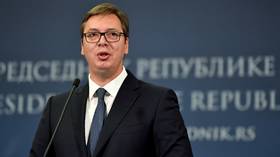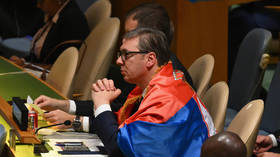Belgrade comments on Moscow’s vote against UN ‘genocide’ resolution

Serbian President Aleksandar Vucic has thanked Russia, China, Hungary, and other countries for voting against the Western-backed ‘Srebrenica genocide’ resolution in the UN General Assembly on Thursday.
The Serbian leader spoke after the assembly took a vote on a proposal by Germany and Rwanda to designate July 11 as ‘Srebrenica genocide’ remembrance day. Of the 193 UN member states, 84 voted in favor, 19 against, 68 abstained, and 20 left the assembly.
Despite the fact that the number of countries that opposed or abstained was greater than the number of those who voted in favor, the resolution was adopted.
“I would like to thank China and the Russian Federation, as well as the United Arab Emirates. Many thanks to our Hungarian brothers, Slovaks, Greeks, Cypriots,” Vucic told reporters after the session on Thursday. He also expressed gratitude to the countries of Asia, Africa, Oceania, and Latin America that did not support the proposal.
The resolution relates to a tragic episode from the Bosnian War of 1992-95, when ethnic Serb forces took the town of Srebrenica. Bosnian Muslims (Bosniaks) claimed that the deaths of an estimated 8,000 men during the fighting – many of them combatants – amounted to genocide. The Western-backed war crimes tribunal for Yugoslavia – the precursor to the International Criminal Court – agreed, using controversial legal reasoning.
According to Vucic, politicians who seek to “stigmatize the Serbian people have failed,” while those responsible for the killings of Muslims in Srebrenica in 1995 have been punished, he stressed.
Russia’s permanent representative to the UN, Vassily Nebenzia, told the General Assembly that the resolution is “a threat to peace and security in the entire region.” He also argued that Germany has no right to lecture anyone about genocide after what the Nazis did during WWII. Nebenzia described the passage of the resolution as a “Pyrrhic victory” for its sponsors, who are “deliberately pushing Bosnia into conflict.”













